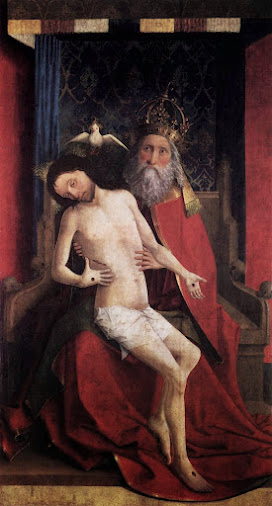 |
| “The Throne of Grace” by an Unknown German Master, 1440s |
Thus says the Lord:
When Israel was a child I loved him,
out of Egypt I called my son.
The more I called them,
the farther they went from me,
Sacrificing to the Baals
and burning incense to idols.
Yet it was I who taught Ephraim to walk,
who took them in my arms;
I drew them with human cords,
with bands of love;
I fostered them like one
who raises an infant to his cheeks;
Yet, though I stooped to feed my child,
they did not know that I was their healer.
My heart is overwhelmed,
my pity is stirred.
I will not give vent to my blazing anger,
I will not destroy Ephraim again;
For I am God and not man,
the Holy One present among you;
I will not let the flames consume you.
-------------------------------------------
Commentary on Hos 11:1-4, 8e-9
The prophet Hosea, speaking with God’s voice, uses the metaphor of a parent’s love for a child to express God’s love for the people of Israel and Ephraim. With love, says the prophet, God sees the people as a child who turns away from their parent, turning their backs upon the Lord and sacrificing to other gods. In spite of this faithless behavior, Hosea’s oracle promises not to destroy them (again) by flames. (Note: in part d of v. 8, not included in the passage we read today, the prophet makes reference to Admah and Zeboiim: cities destroyed with Sodom and Gomorrah (Deuteronomy 29:22)).
CCC: Hos 11 219; Hos 11:1-4 370; Hos 11:1 219, 441, 530; Hos 11:9 208
-------------------------------------------
Responsorial Psalm: Psalm 80:2ac and 3b, 15-16
R. (4b) Let us see your face, Lord, and we shall be saved.
O shepherd of Israel, hearken.
From your throne upon the cherubim, shine forth.
Rouse your power.
R. Let us see your face, Lord, and we shall be saved.
Once again, O Lord of hosts,
look down from heaven, and see:
Take care of this vine,
and protect what your right hand has planted,
the son of man whom you yourself made strong.
R. Let us see your face, Lord, and we shall be saved.
-------------------------------------------
Commentary on Ps 80:2ac and 3b, 15-16
Psalm 80 is a communal lament. Here the community exalts the king who shepherds Israel with fidelity, and calls upon God to continue to protect his special creation, the people he has called.
-------------------------------------------
Gospel: Matthew 10:7-15
Jesus said to his Apostles:
“As you go, make this proclamation:
‘The Kingdom of heaven is at hand.’
Cure the sick, raise the dead,
cleanse the lepers, drive out demons.
Without cost you have received; without cost you are to give.
Do not take gold or silver or copper for your belts;
no sack for the journey, or a second tunic,
or sandals, or walking stick.
The laborer deserves his keep.
Whatever town or village you enter, look for a worthy person in it,
and stay there until you leave.
As you enter a house, wish it peace.
If the house is worthy,
let your peace come upon it;
if not, let your peace return to you.
Whoever will not receive you or listen to your words
go outside that house or town and shake the dust from your feet.
Amen, I say to you, it will be more tolerable
for the land of Sodom and Gomorrah on the day of judgment
than for that town.”
-------------------------------------------
Commentary on Mt 10:7-15
Jesus instructs the Apostles, as he sends them on their mission to proclaim the Kingdom of God. They are to go into the world without any provisions, and will depend upon the generosity of others. The Lord gives them authority over all manner of diseases and afflictions, but reminds them that they are not to request payment for these gifts of healing.
The Lord's instructions end with a warning to those who reject the proclamation of the Kingdom of God. Jesus tells the Apostles that those who reject the peace they offer will suffer, like those cut off from God's grace by the judgment upon those who perished in the destruction of Sodom and Gomorrah (see Genesis 19:1-26).
CCC: Mt 10:5-7 543; Mt 10:8 1509, 2121, 2443; Mt 10:10 2122
-------------------------------------------
Reflection:
Yet, though I stooped to feed my child,
they did not know that I was their healer.
(Hosea 11:4c)
While the prophet Hosea, speaking with the voice of God, was prophesying about Israel’s fall from grace and the knowledge of the Father, his analogy of feeding his children is apt. We come to this place to be fed, to be healed, because we understand that the spiritual gifts that flow from this altar in the form of bread and wine are the healing presence of the One Lord.
[1] The picture is from the Darmstadt Altarpiece: “The Throne of Grace” by an Unknown German Master, 1440s.
[2] S.S. Commemoratio
[3] The readings are taken from the New American Bible, with the exception of the psalm and its response which were developed by the International Committee for English in Liturgy (ICEL). This republication is not authorized by USCCB and is for private use only.
No comments:
Post a Comment